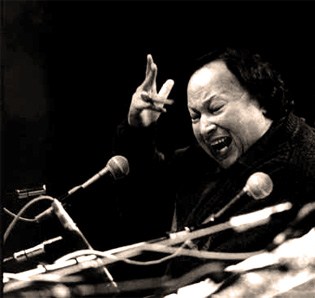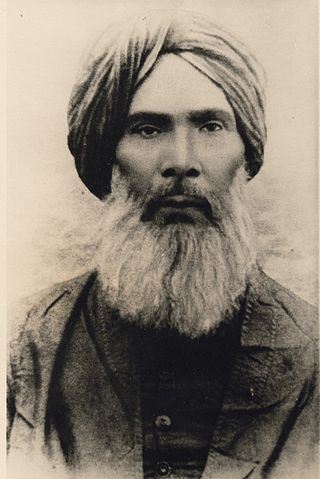Related Research Articles

Ustad Nusrat Fateh Ali Khan was a Pakistani singer, songwriter, and music director. He was primarily a singer of qawwali — a form of Sufi devotional music. Often called the "Shahenshah-e-Qawwali", he is considered by The New York Times to be the greatest qawwali singer of his generation. He was described as the fourth greatest singer of all time by LA Weekly in 2016. He was known for his vocal abilities and could perform at a high level of intensity for several hours. Khan is widely credited with introducing qawwali music to international audiences. He was also a master in Hindustani classical music.
The Music of Pakistan includes diverse elements ranging from music from various parts of South Asia as well as Central Asian, Middle Eastern, and modern-day Western popular music influences. With these multiple influences, a distinctive Pakistani music has emerged.

Qawwali is a form of Sufi Islamic devotional singing originating in South Asia. Originally performed at Sufi shrines or dargahs throughout South Asia, it is famous throughout Pakistan, India, Bangladesh and Afghanistan and has also gained mainstream popularity and an international audience as of the late 20th century.

Rahat Fateh Ali Khan is a Pakistani singer, primarily Qawwali, a form of Sufi devotional music. Khan is one of the most popular and highest paid singers in Pakistan. He is the nephew of Nusrat Fateh Ali Khan, son of Farrukh Fateh Ali Khan and grandson of Qawwali singer Fateh Ali Khan. In addition to Qawwali, he also performs ghazals and other light music. He is also well-known as a playback singer in Hindi cinema and the Pakistan film industry.
Fateh Ali Khan Jullundhri Qawwal was a classical singer and a qawwali musician in the 1940s and 1950s.

Farrukh Fateh Ali Khan was a Pakistani musician, who played the harmonium in Qawwali music. He was also a member of a well-known family of Qawwali musicians, the Qawwal Bacchon gharana, he was the younger brother of Nusrat Fateh Ali Khan, the son of Fateh Ali Khan, the nephew of Mubarak Ali Khan, and the father of Rahat Fateh Ali Khan.
Rizwan-Muazzam Qawwali is a Pakistani Qawwali group, headed by Nusrat Fateh Ali Khan's nephews, Rizwan and Muazzam. They have performed at several editions of WOMAD since 1998, and have recorded several albums.
Filmi qawwali is a form of qawwali music found in the Lollywood, Dhallywood, Tollywood, and Bollywood film industries.

Shah Hussain, also known as Madhoo Lal Hussain, was a 16th-century Punjabi Sufi poet who is regarded as a pioneer of the Kafi form of Punjabi poetry. He lived during the ruling periods of Mughal emperors Akbar and his son Jahangir.

Ameer Minai or Amir Meenai was a 19th-century Indian Urdu poet. He was respected by several contemporary poets including Ghalib and Daagh Dehalvi and by Muhammad Iqbal. He wrote in Urdu, Persian and Arabic.
Dama Dam Mast Qalandar is a spiritual Sufi qawwali written in the honour of the most revered Sufi saint of Sindh, Lal Shahbaz Qalandar (1177–1274) of Sehwan Sharif. The origins of the poem is unknown, since no recordings or written documents exist mentioning it prior to the 1950s. However, legends around the Shrine of Lal Shahbaz Qalandar in Sehwan suggest that the original poem was initially written by the 13th-century Sufi poet Amir Khusrow, then further modified by Bulleh Shah in the 18th century. The poem includes a reference to the town of Sehwan, and the word "Lal" can refer to Lal Shahbaz Qalandar as a young man, his legendary ruby glow, or his red dress. Bulleh Shah gave an entirely different color to the qawwali, adding verses in praises of Shahbaz Qalandar and giving it a large tint of Sindhi culture. It also venerates Ali, the cousin and son-in-law of Muhammad.

Muhammad Siddique ناز خیالوی, pen name Naz Khialvi, was a Pakistani lyricist and radio broadcaster, who is mainly known for his Sufi verse Tum Ek Gorakh Dhanda Ho, later sung by Nusrat Fateh Ali Khan, a legendary Qawwali singer, making both of them a household name. He also hosted a radio programme, Sandhal Dharti at Faisalabad radio station for 27 years.

Sheikh Muhammad Sadiq or S M Sadiq is a Pakistani lyricist and a poet whose written songs frequently have been sung by Ustad Nusrat Fateh Ali Khan, and other singers like Attaullah Khan Esakhelvi, Aziz Mian, Shabnam Majeed, Shahid Ali Khan and Arif Lohar.

Niaz Ahmed was a Pakistani television, radio, and film musician. He is known for composing classical, semi-classical, and patriotic songs for Radio Pakistan and Pakistan Television. His popular melodies include "Itne Baray Jeevan Saagar Mein Tu Ne Pakistan Dia", "Dekh Tera Kiya Rang Kar dia Hai", "Mera Inaam Pakistan", and many others. He was honored with the Pride of Performance Award in 2004.
Maula Bakhsh Khan, also known as Ali Khan, was a Qawwal from Basti Sheikh, Jullundur, British India. He was the father of Fateh Ali Khan, Mubarak Ali Khan, and Salamat Ali Khan. He was also the grandfather of both Nusrat Fateh Ali Khan and Farrukh Fateh Ali Khan, and great-grandfather of Rahat Fateh Ali Khan. Maula Bakhsh Khan was highly experienced in Qawwali, being adept in playing the violin, sitar, and harmonium. Khan was fluent in Urdu and Punjabi, and mastered verses in Persian and Arabic as well.

Shahzaman Ali Khan is a Pakistani singer from Faisalabad, Pakistan. He is the son of the popular Pakistani singer Rahat Fateh Ali Khan. Shahzaman is also the grandson of Farrukh Fateh Ali Khan, and grandnephew of the "Shahenshah-e-Qawwali ", Nusrat Fateh Ali Khan. Shahzaman primarily performs Qawwali, but also performs classical music alongside his father. Shahzaman's vocals and style of singing has been greatly compared to his granduncle's, Nusrat Fateh Ali Khan, with him sometimes being referred to as "Nusrat Fateh Ali Khan 2.0".
References
- 1 2 Dum Mast Mast Qalander Fame Poet Bari Nizami Geo TV Report (in Urdu). 15 May 2012 – via YouTube.
Geo TV report on the 14th death anniversary
- 1 2 Profile of Bari Nizami on Bio-bibliographies website (in Urdu language) Retrieved 23 December 2019
- ↑ Anurag Verma (7 April 2018). "11 Bollywood Songs That You Didn't Know Were Copied Or 'Inspired' From Pakistan". NEWS18 website. Retrieved 23 December 2019.
- ↑ Zaman Khan (16 February 2018). "Cafes of Lyallpur (now called Faisalabad)". Academy of the Punjab in North America (APNA) website. Retrieved 23 December 2019.